Abstract
Accumulation of the tumour-suppressor protein p53 in breast cancer is associated with several prognostic factors that indicate an aggressive, rapidly proliferating tumour with an unstable genome. To assess p53 accumulation in stage I breast cancer and to evaluate the prognostic value of both nuclear and cytoplasmic p53, 205 patients with node-negative breast cancer and tumour size less than or equal to 20 mm were examined. Immunohistochemistry was performed on frozen sections with the monoclonal antibodies PAb 1801 and DO1. Cellular p53 accumulation, within either the nucleus or the cytoplasm or in both, showed the same association with different pathobiological variables as nuclear accumulation alone. Eleven per cent of the tumours showed strong nuclear accumulation and were significantly correlated to age under 50 years, negative oestrogen receptor status, DNA aneuploidy, high S-phase fraction, high pathological grade and poor prognosis. The distant recurrence rate ratio was 6.2 (P = 0.002). It is thus concluded that p53 accumulation is of prognostic value in early stage breast cancer.
Full text
PDF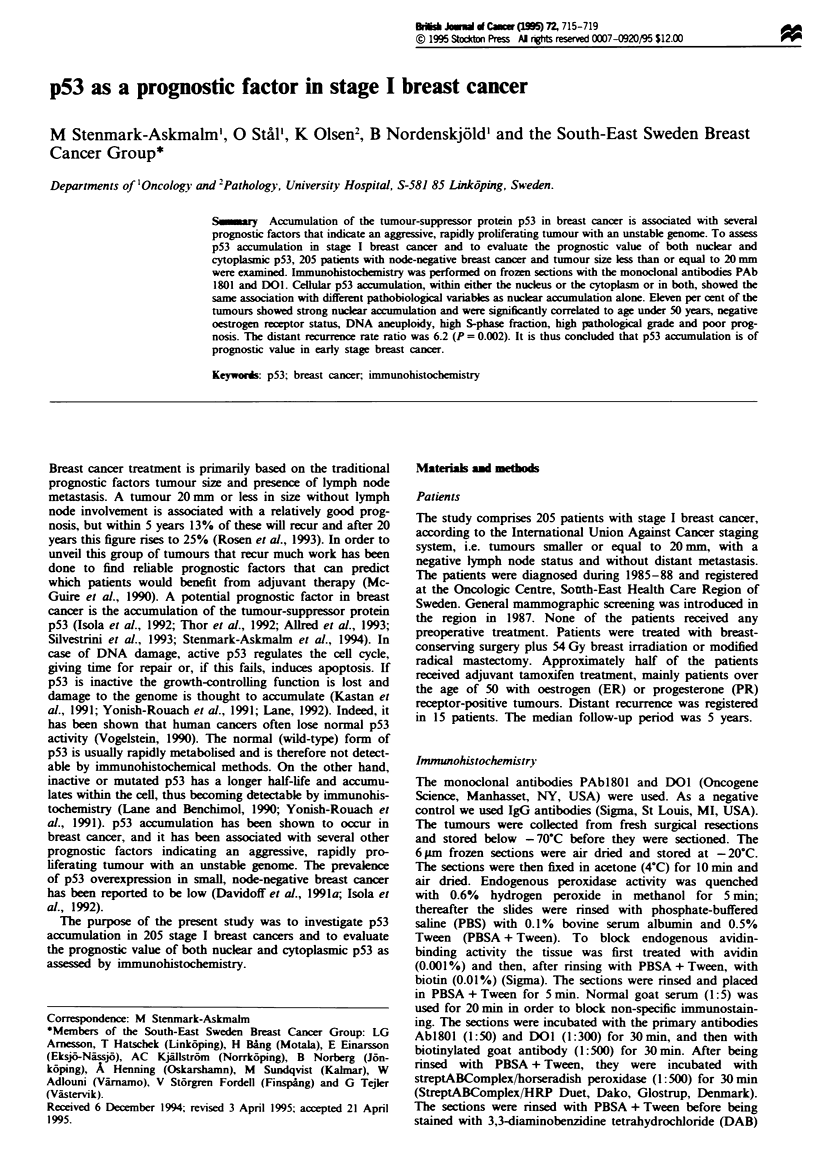
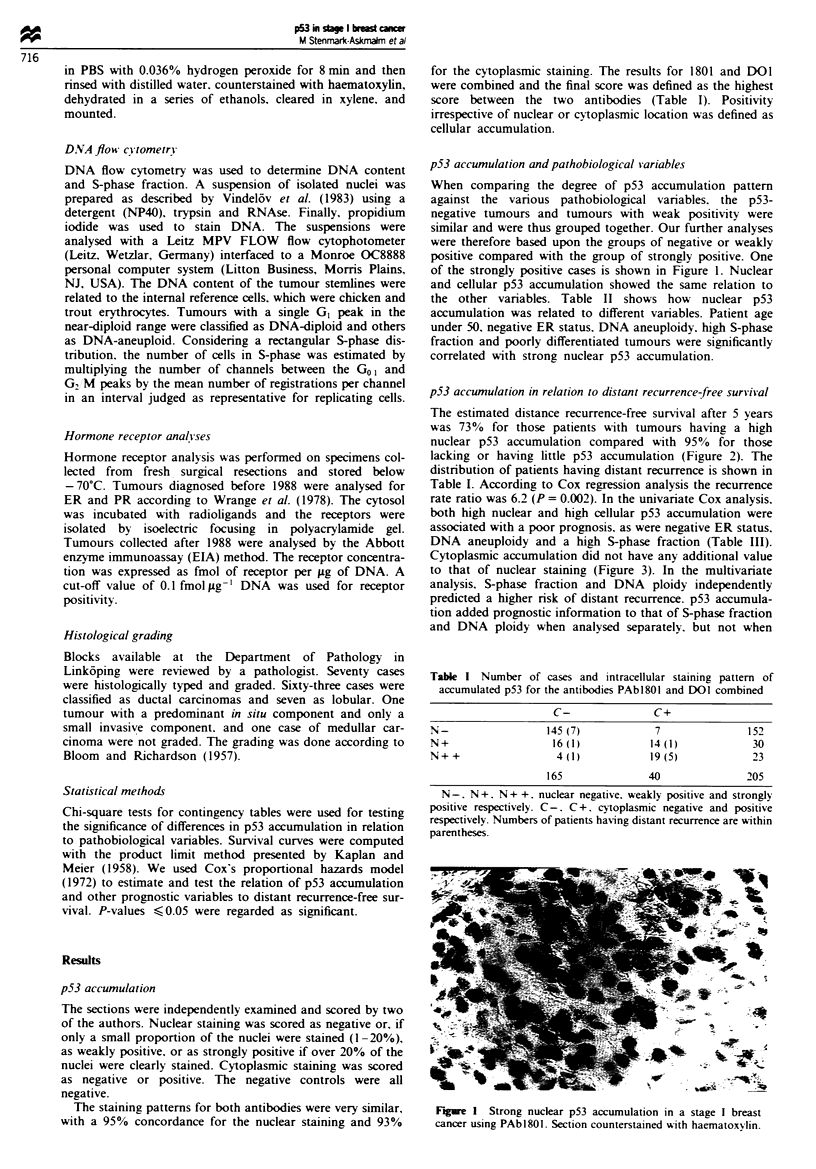
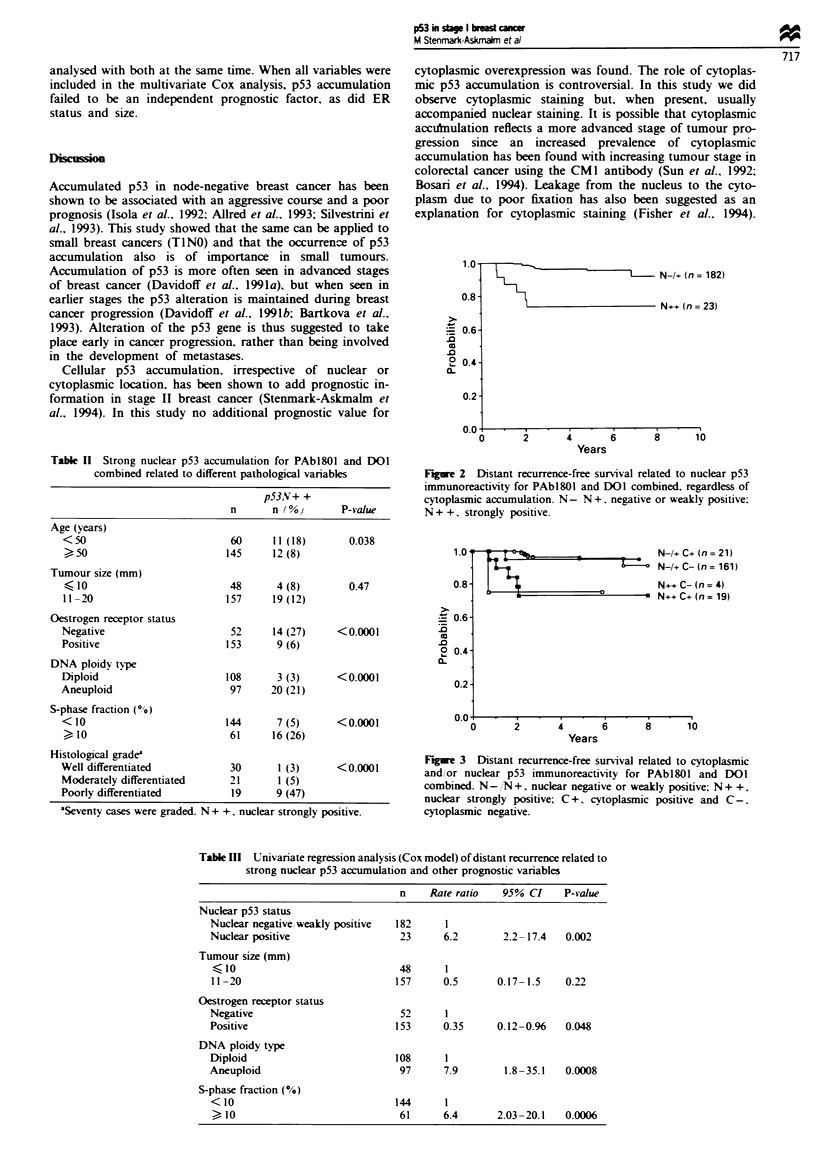
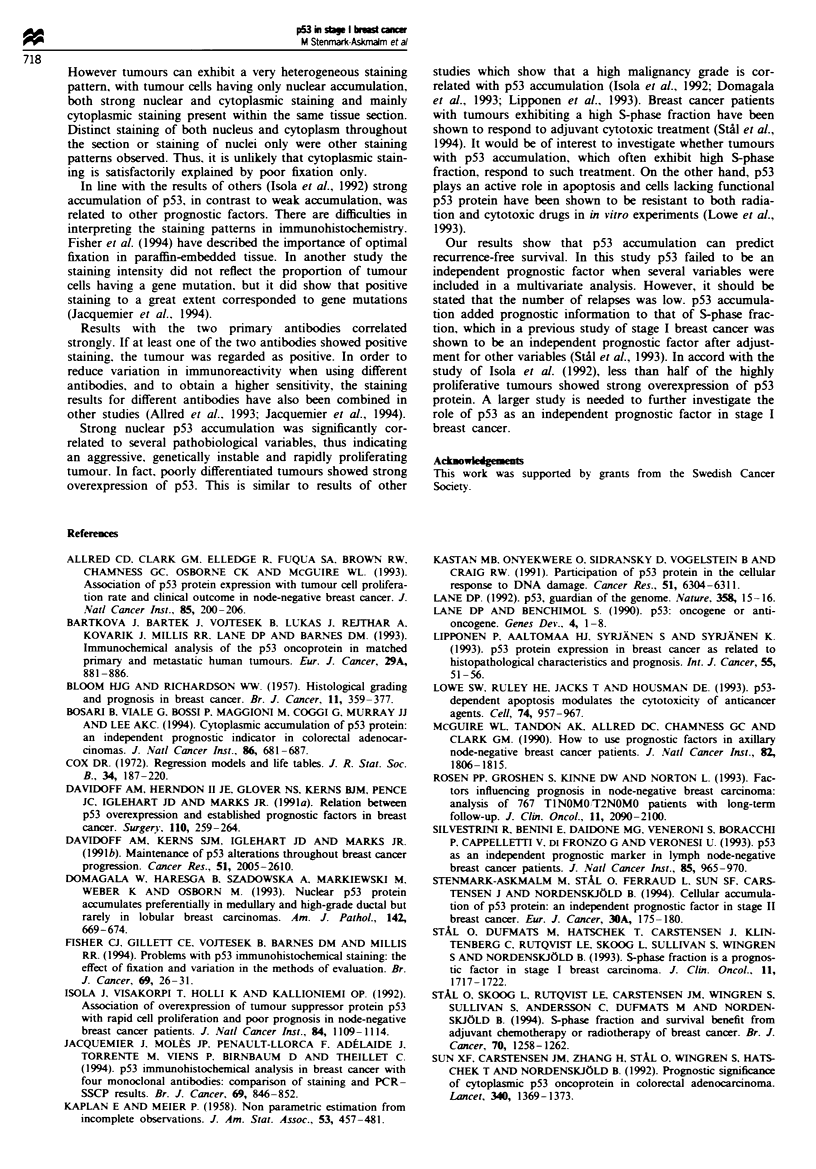
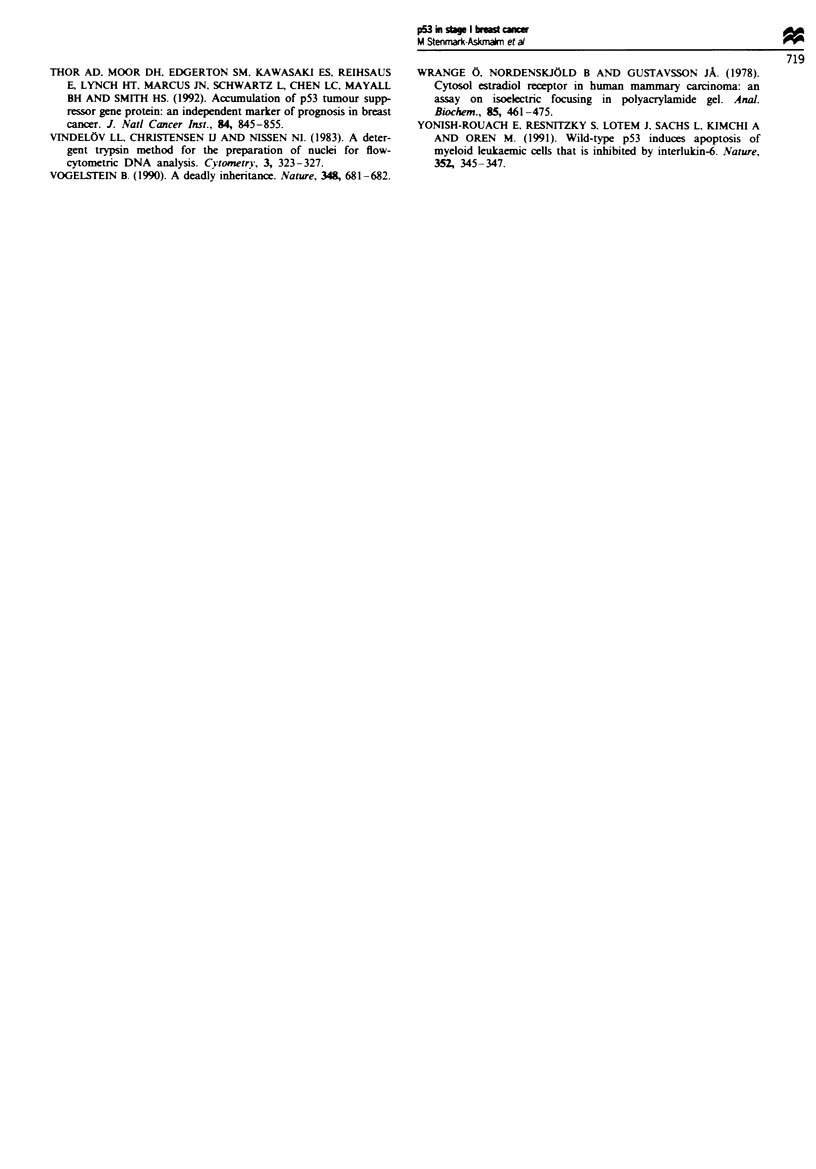
Images in this article
Selected References
These references are in PubMed. This may not be the complete list of references from this article.
- Allred D. C., Clark G. M., Elledge R., Fuqua S. A., Brown R. W., Chamness G. C., Osborne C. K., McGuire W. L. Association of p53 protein expression with tumor cell proliferation rate and clinical outcome in node-negative breast cancer. J Natl Cancer Inst. 1993 Feb 3;85(3):200–206. doi: 10.1093/jnci/85.3.200. [DOI] [PubMed] [Google Scholar]
- BLOOM H. J., RICHARDSON W. W. Histological grading and prognosis in breast cancer; a study of 1409 cases of which 359 have been followed for 15 years. Br J Cancer. 1957 Sep;11(3):359–377. doi: 10.1038/bjc.1957.43. [DOI] [PMC free article] [PubMed] [Google Scholar]
- Bartkova J., Bartek J., Vojtesek B., Lukas J., Rejthar A., Kovarik J., Millis R. R., Lane D. P., Barnes D. M. Immunochemical analysis of the p53 oncoprotein in matched primary and metastatic human tumours. Eur J Cancer. 1993;29A(6):881–886. doi: 10.1016/s0959-8049(05)80431-9. [DOI] [PubMed] [Google Scholar]
- Bosari S., Viale G., Bossi P., Maggioni M., Coggi G., Murray J. J., Lee A. K. Cytoplasmic accumulation of p53 protein: an independent prognostic indicator in colorectal adenocarcinomas. J Natl Cancer Inst. 1994 May 4;86(9):681–687. doi: 10.1093/jnci/86.9.681. [DOI] [PubMed] [Google Scholar]
- Davidoff A. M., Herndon J. E., 2nd, Glover N. S., Kerns B. J., Pence J. C., Iglehart J. D., Marks J. R. Relation between p53 overexpression and established prognostic factors in breast cancer. Surgery. 1991 Aug;110(2):259–264. [PubMed] [Google Scholar]
- Davidoff A. M., Kerns B. J., Iglehart J. D., Marks J. R. Maintenance of p53 alterations throughout breast cancer progression. Cancer Res. 1991 May 15;51(10):2605–2610. [PubMed] [Google Scholar]
- Domagala W., Harezga B., Szadowska A., Markiewski M., Weber K., Osborn M. Nuclear p53 protein accumulates preferentially in medullary and high-grade ductal but rarely in lobular breast carcinomas. Am J Pathol. 1993 Mar;142(3):669–674. [PMC free article] [PubMed] [Google Scholar]
- Fisher C. J., Gillett C. E., Vojtesek B., Barnes D. M., Millis R. R. Problems with p53 immunohistochemical staining: the effect of fixation and variation in the methods of evaluation. Br J Cancer. 1994 Jan;69(1):26–31. doi: 10.1038/bjc.1994.4. [DOI] [PMC free article] [PubMed] [Google Scholar]
- Isola J., Visakorpi T., Holli K., Kallioniemi O. P. Association of overexpression of tumor suppressor protein p53 with rapid cell proliferation and poor prognosis in node-negative breast cancer patients. J Natl Cancer Inst. 1992 Jul 15;84(14):1109–1114. doi: 10.1093/jnci/84.14.1109. [DOI] [PubMed] [Google Scholar]
- Jacquemier J., Molès J. P., Penault-Llorca F., Adélaide J., Torrente M., Viens P., Birnbaum D., Theillet C. p53 immunohistochemical analysis in breast cancer with four monoclonal antibodies: comparison of staining and PCR-SSCP results. Br J Cancer. 1994 May;69(5):846–852. doi: 10.1038/bjc.1994.164. [DOI] [PMC free article] [PubMed] [Google Scholar]
- Kastan M. B., Onyekwere O., Sidransky D., Vogelstein B., Craig R. W. Participation of p53 protein in the cellular response to DNA damage. Cancer Res. 1991 Dec 1;51(23 Pt 1):6304–6311. [PubMed] [Google Scholar]
- Lane D. P. Cancer. p53, guardian of the genome. Nature. 1992 Jul 2;358(6381):15–16. doi: 10.1038/358015a0. [DOI] [PubMed] [Google Scholar]
- Lipponen P., Ji H., Aaltomaa S., Syrjänen S., Syrjänen K. p53 protein expression in breast cancer as related to histopathological characteristics and prognosis. Int J Cancer. 1993 Aug 19;55(1):51–56. doi: 10.1002/ijc.2910550110. [DOI] [PubMed] [Google Scholar]
- Lowe S. W., Ruley H. E., Jacks T., Housman D. E. p53-dependent apoptosis modulates the cytotoxicity of anticancer agents. Cell. 1993 Sep 24;74(6):957–967. doi: 10.1016/0092-8674(93)90719-7. [DOI] [PubMed] [Google Scholar]
- Rosen P. P., Groshen S., Kinne D. W., Norton L. Factors influencing prognosis in node-negative breast carcinoma: analysis of 767 T1N0M0/T2N0M0 patients with long-term follow-up. J Clin Oncol. 1993 Nov;11(11):2090–2100. doi: 10.1200/JCO.1993.11.11.2090. [DOI] [PubMed] [Google Scholar]
- Silvestrini R., Benini E., Daidone M. G., Veneroni S., Boracchi P., Cappelletti V., Di Fronzo G., Veronesi U. p53 as an independent prognostic marker in lymph node-negative breast cancer patients. J Natl Cancer Inst. 1993 Jun 16;85(12):965–970. doi: 10.1093/jnci/85.12.965. [DOI] [PubMed] [Google Scholar]
- Stenmark-Askmalm M., Stål O., Sullivan S., Ferraud L., Sun X. F., Carstensen J., Nordenskjöld B. Cellular accumulation of p53 protein: an independent prognostic factor in stage II breast cancer. Eur J Cancer. 1994;30A(2):175–180. doi: 10.1016/0959-8049(94)90082-5. [DOI] [PubMed] [Google Scholar]
- Stål O., Dufmats M., Hatschek T., Carstensen J., Klintenberg C., Rutqvist L. E., Skoog L., Sullivan S., Wingren S., Nordenskjöld B. S-phase fraction is a prognostic factor in stage I breast carcinoma. J Clin Oncol. 1993 Sep;11(9):1717–1722. doi: 10.1200/JCO.1993.11.9.1717. [DOI] [PubMed] [Google Scholar]
- Stål O., Skoog L., Rutqvist L. E., Carstensen J. M., Wingren S., Sullivan S., Andersson A. C., Dufmats M., Nordenskjöld B. S-phase fraction and survival benefit from adjuvant chemotherapy or radiotherapy of breast cancer. Br J Cancer. 1994 Dec;70(6):1258–1262. doi: 10.1038/bjc.1994.483. [DOI] [PMC free article] [PubMed] [Google Scholar]
- Sun X. F., Carstensen J. M., Zhang H., Stål O., Wingren S., Hatschek T., Nordenskjöld B. Prognostic significance of cytoplasmic p53 oncoprotein in colorectal adenocarcinoma. Lancet. 1992 Dec 5;340(8832):1369–1373. doi: 10.1016/0140-6736(92)92558-w. [DOI] [PubMed] [Google Scholar]
- Thor A. D., Moore DH I. I., Edgerton S. M., Kawasaki E. S., Reihsaus E., Lynch H. T., Marcus J. N., Schwartz L., Chen L. C., Mayall B. H. Accumulation of p53 tumor suppressor gene protein: an independent marker of prognosis in breast cancers. J Natl Cancer Inst. 1992 Jun 3;84(11):845–855. doi: 10.1093/jnci/84.11.845. [DOI] [PubMed] [Google Scholar]
- Vindeløv L. L., Christensen I. J., Nissen N. I. A detergent-trypsin method for the preparation of nuclei for flow cytometric DNA analysis. Cytometry. 1983 Mar;3(5):323–327. doi: 10.1002/cyto.990030503. [DOI] [PubMed] [Google Scholar]
- Vogelstein B. Cancer. A deadly inheritance. Nature. 1990 Dec 20;348(6303):681–682. doi: 10.1038/348681a0. [DOI] [PubMed] [Google Scholar]
- Wrange O., Nordenskjöld B., Gustafsson J. A. Cytosol estradiol receptor in human mammary carcinoma: an assay based on isoelectric focusing in polyacrylamide gel. Anal Biochem. 1978 Apr;85(2):461–475. doi: 10.1016/0003-2697(78)90243-9. [DOI] [PubMed] [Google Scholar]
- Yonish-Rouach E., Resnitzky D., Lotem J., Sachs L., Kimchi A., Oren M. Wild-type p53 induces apoptosis of myeloid leukaemic cells that is inhibited by interleukin-6. Nature. 1991 Jul 25;352(6333):345–347. doi: 10.1038/352345a0. [DOI] [PubMed] [Google Scholar]



